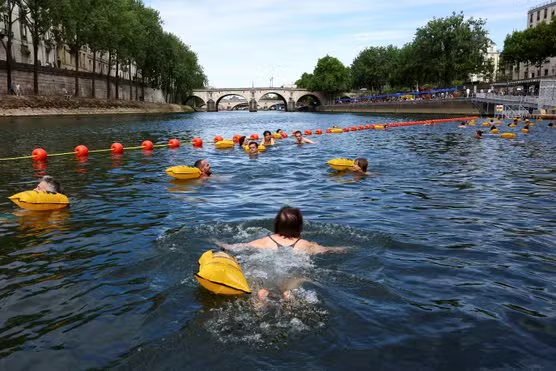A day after Parisians rejoiced in a historic return to swimming in the Seine River, red flags were raised on Sunday, July 6, across three designated bathing areas, signaling an abrupt closure due to water pollution triggered by heavy rainfall.
The shutdown, announced via the city hall website, reignited concerns over Paris’s ability to maintain the river’s water quality during summer rains. The Seine had officially reopened to swimmers on July 5 for the first time in over a century, following a decades-long ban introduced in 1923 due to severe pollution.
Saturday’s reopening was celebrated as a symbolic triumph of the city’s extensive cleanup mission, with swimmers of all ages diving into the water for a long-awaited dip.
However, Sunday’s rainfall proved to be a critical setback. Paris’s mid-19th-century sewage infrastructure is known to overflow during storms, causing untreated rainwater mixed with waste to discharge directly into the Seine.
This overflow significantly raises levels of harmful bacteria such as E. coli and enterococci, making the water unsafe for human contact.
City officials had anticipated such disruptions. Paris Deputy Mayor for Sports, Pierre Rabadan, confirmed that water quality assessments would be conducted daily throughout the season. Flags—green, orange, or red—are displayed each morning to signal the day’s bathing conditions to the public.
“On rainy days, the chances of contamination rise sharply,” Rabadan stated, noting that closures would likely follow significant precipitation events. “The system is working as expected. Safety remains our top priority.”
Another site scheduled to open along the Canal Saint-Martin in eastern Paris also remained closed on Sunday due to similar concerns. Local authorities posted on X (formerly Twitter) that the rain had “compromised water quality” and prevented the site from opening as planned.
The seasonal reintroduction of public swimming in the Seine is one of the enduring legacies of the Paris 2024 Olympic Games. Organizers invested approximately €1.4 billion ($1.6 billion) in efforts to clean the river, install new water treatment systems, and upgrade aging sewage networks.
Olympic triathletes and open-water swimmers competed in the Seine during the Games, offering a global display of its newfound cleanliness.
Still, record rainfall during the Games led to the cancellation of six out of eleven river-based competitions, demonstrating the limits of infrastructure improvements in the face of extreme weather.
The city’s goal of making the Seine a clean and accessible urban waterway remains in sight, but Sunday’s closures underscore the ongoing challenge of reconciling Paris’s historic architecture with modern environmental ambitions. For now, swimmers will have to wait for clearer skies before diving back in.
